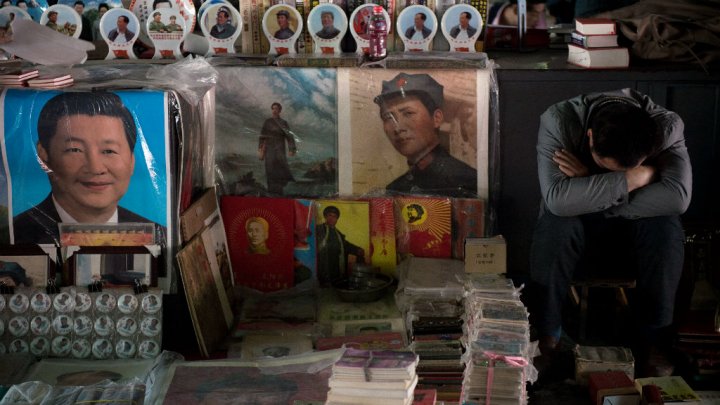
A vendor takes a nap next to posters showing the late Chinese chairman Mao Zedong and Chinese President Xi Jinping at a market in Beijing on May 15, 2016. Photo by AFP
Exactly 50 years ago, China embarked on what was formally known as the Great Proletarian Cultural Revolution, a decade of tumult launched by Mao Zedong to revive communist goals and enforce a radical egalitarianism.
The milestone was largely ignored Monday in the Chinese media, reflecting continuing sensitivities about a period that was later declared a “catastrophe.”
Authorities have generally suppressed discussion of the violent events, now a couple of generations removed from the lives of young Chinese focused on pursuing their own interests in an increasingly capitalistic society.
“There’s no doubt that the Chinese government see the Cultural Revolution as a very embarrassing and dark blip in Chinese history,” said FRANCE 24 correspondent Mark Masterton. “They’re very keen to avoid any public acknowledgement.”
On May 16, 1966, the party’s Politburo met to purge a quartet of top officials who had fallen out of favor with Mao. It also produced a document announcing the start of the decade-long Cultural Revolution to pursue class warfare and enlist the population in mass political movements.
The start of the Cultural Revolution was not widely known or understood at the time, but soon took on an agenda characterised by extreme violence, leading to the downfall of leading officials, factional battles, mass rallies and the exile of educated youths to the countryside. It wound up severely threatening the Communist Party’s legitimacy to rule.
No official events were held to commemorate Monday’s anniversary, although neo-Maoists have been staging private commemorations. Many are motivated by nostalgia for a simpler time and alienated by a growing wealth gap brought about by the government’s pursuit of market economics and abandonment of the former command economy that provided jobs and welfare to its citizens, even amid widespread poverty.
Newspapers monitored in Beijing provided virtually no coverage of the anniversary apart from small articles mentioning demand for antiques dating from the era.
Egged on by vague pronouncements from Mao, students and young workers clutching their leader’s famed “Little Red Book” of sayings formed rival Red Guard factions starting in 1966 that battled each other over ideological purity, sometimes using heavy weapons taken from the military. Few sought to oppose them given Mao’s approval and the popularity of slogans such as “to revolt is justified”, and “revolution is not a crime.”
Rising violence later compelled party leaders to send in the People’s Liberation Army to reassert control as many government functions were suspended and long-standing party leaders sent to work in farms and factories or detained in makeshift jails. To put a stop to the violence and chaos, millions of students were dispatched to the countryside to live and work with the peasantry, among them current President Xi Jinping, who lived in a cave dwelling for several years in his family’s ancestral province of Sha’anxi.
Much of the country was on a wartime footing during the period, with Mao growing increasingly feeble and tense relations with former ally the Soviet Union breaking out into border clashes. Radicals allied with the so-called “Gang of Four”, consisting of Mao’s wife Jiang Qing and her confederates, battled with those representing the party’s old guard, who were desperate to end the chaos in the economy, schools and government institutions.
“Up to 1.5 million Chinese people lost their lives during the 10-year reign of Chairman Mao Zedong, either from starvation, execution, torture or suicide,” said Masterton.
The Cultural Revolution finally came to a close with Mao’s death on Sept. 9, 1976. In the aftermath, Deng Xiaoping emerged as the country’s paramount leader, initiating four decades of economic development and a gradual repudiation of orthodox Marxism.
China formally closed the book on the era with a 1981 party document approved by Deng declaring it a “catastrophe” for the nation, but which largely exonerated Mao, whose portrait continues to hang from iconic Tiananmen Gate in the heart of Beijing and is stamped on banknotes.
The national curriculum offers students only a minimal account of the events, although a number of former Red Guards have written about their experiences and some have come forward to apologize to those they persecuted. – FRANCE 24 with AP
